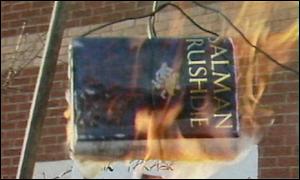
THE SATANIC VERSES UPROAR
The publication of The Satanic Verses in September 1988 caused immediate controversy in the Islamic world due to its irreverent depiction of the prophet Muhammad. The book
describes a prophet of God named "Mahound" who mixes
"Satanic verses with the divine" (hence the title of the novel).
India banned the book on October 5; South Africa banned it on
November 24; and Pakistan, Saudi Arabia, Egypt, Somalia,
Bangladesh, Sudan, Malaysia, Indonesia, and Qatar followed
within weeks. On January 14, 1989 the novel was the subject of
a book burning event in Bradford, England. On February 12,
five people were shot and killed by the police during a protest
in Islamabad.
On February 14, 1989, a fatwa requiring Rushdie's execution
was proclaimed on Radio Tehran by Ayatollah Ruhollah Khomeini, the leader of Iran, calling the book "blasphemous against Islam." As the novel also suggested that Rushdie no longer believed in Islam, Khomeini also condemned him for apostasy, which according to the Hadith is punishable by death. Khomeini indicated that it was the responsibility of all "zealous Muslims" to execute Rushdie and the publishers who were aware of its concepts. On February 24 1989, Khomeini offered a U.S.$ 3 million bounty for the death of Rushdie, who was then forced to live for a time under British-financed security.
Meanwhile, further violence occurred around the world, with the firebombing of bookstores in Berkeley, California which stocked the novel, and the offices of The Riverdale Press, a weekly newspaper in The Bronx, in response to an editorial which defended the right to read the book. On February 24, five people were shot and killed by the police during a protest outside the British consulate in Bombay. Several other people died in Egypt and elsewhere. Muslim communities throughout the world held public rallies in which copies of the book were burned. In 1991, Rushdie's Japanese translator, Hitoshi Igarashi, was stabbed and killed at the university where he taught in Tsukuba, Ibaraki, north of Tokyo, and his Italian translator was beaten and stabbed in Milan. In 1993, Rushdie's Norwegian publisher William Nygaard was shot and severely injured in an attack outside his house in Oslo. Thirty-seven people died when their hotel in Sivas, Turkey was burnt down by locals protesting against Aziz Nesin, Rushdie's Turkish translator.
Even popular musician Yusuf Islam (formerly known as Cat Stevens) infamously gave indirect support for the fatwa, and in 1989, confirmed during a British television documentary that he was not opposed to the death sentence. Islam stated that rather than attend a demonstration where Rushdie would be burned in effigy, "I would have hoped that it'd be the real thing", and that if Rushdie showed up at his door, he "might ring somebody who might do more damage to him than he would like... I'd try to phone the Ayatollah Khomeini and tell him exactly where this man is.".
After the death of Khomeini in 1989, Rushdie published an essay in 1990, In Good Faith, to appease his critics and issued an apology in which he seems to have reaffirmed his respect for Islam. However, Iranian clerics did not retract the fatwa. Rushdie has made further statements in defence of his book but many in the Muslim community still consider him a wanted man.
In 1997, the bounty was doubled, and the next year the highest Iranian state prosecutor restated his support. In 1998 the Iranian government publicly declared that it would not carry out the death sentence against Rushdie. This was announced as part of a wider agreement to normalise relations between Iran and the United Kingdom. Rushdie subsequently declared that he would stop living in hiding, and that he regretted attempts to appease his critics by making statements to the effect that he was a practicing Muslim. Rushdie affirmed that he is not, in fact, religious. Despite the death of Khomeini and Iranian government's official declaration, according to certain members of the Islamic fundamentalist media the fatwa remains in force.
In 1999, an Iranian foundation placed a $2.8 million bounty on Rushdie's life, and in February 2003, Iran's Revolutionary Guards reiterated the call for the assassination of Rushdie. As reported by the Sunday Herald, "Ayatollah Hassan Saneii, head of the semi-official Khordad Foundation that has placed a $2.8 million bounty on Rushdie's head, was quoted by the Jomhuri Islami newspaper as saying that his foundation would now pay $3 million to anyone who kills Rushdie."
|
